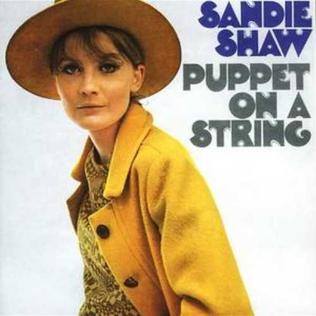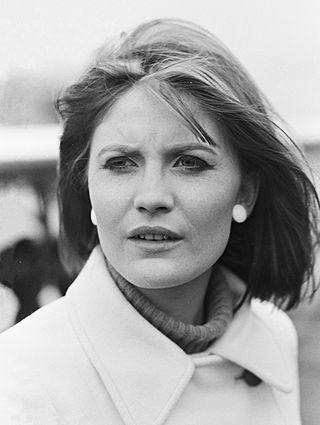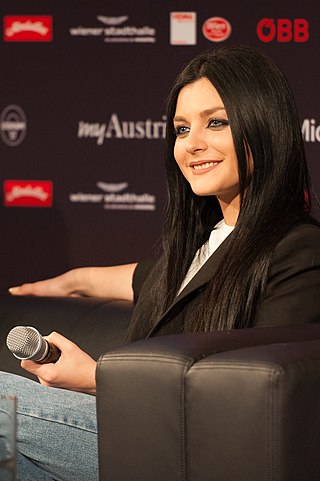The United Kingdom held a national preselection to choose the song that would go to the Eurovision Song Contest 1968.
The United Kingdom held a televised national pre-selection broadcast on BBC1 to choose the song that would go to the Eurovision Song Contest 1969 with Scottish singer Lulu chosen to represent the UK.
The United Kingdom held a national preselection to choose the song that would go to the Eurovision Song Contest 1976.

Eurovision: You Decide is the most recent name of a BBC television programme that was broadcast annually to select the United Kingdom's entry for the Eurovision Song Contest. The show had previously gone under several other names, including Festival of British Popular Songs (1957), Eurovision Song Contest British Final (1959–1960), The Great British Song Contest (1996–1999), Eurovision: Making Your Mind Up (2004–2007), Eurovision: Your Decision (2008), and Eurovision: Your Country Needs You (2009–2010), but was known, for most of its history, as A Song for Europe.

"Puppet on a String" is a song recorded by British singer Sandie Shaw. The song, written by Bill Martin and Phil Coulter, was selected to be the United Kingdom's entry at the Eurovision Song Contest 1967, held in Vienna. Shaw won the contest, the first of the United Kingdom's five Eurovision winners. As her thirteenth UK single release, "Puppet on a String" became a UK Singles Chart number one hit on 27 April 1967, staying at the top for a total of three weeks. In the United States, a 1967 version by Al Hirt went to number 18 on the Adult Contemporary chart and No. 129 on the Billboard Hot 100.
The Netherlands were represented in the Eurovision Song Contest 1957 by Corry Brokken with the song "Net als toen" written by Guus Jansen and Willy van Hemert. The Dutch entry was chosen during a national final called Nationaal Songfestival and the country would go on to win the Eurovision Song Contest.

Puppet on a String is Sandie Shaw's third full-priced album, released on the Pye label in May 1967 on the back of her Eurovision success.

Sandie Shaw is a retired English pop singer. One of the most successful British female singers of the 1960s, she had three UK number one singles with "(There's) Always Something There to Remind Me" (1964), "Long Live Love" (1965) and "Puppet on a String" (1967). With the latter, she became the first British entry to win the Eurovision Song Contest. She returned to the UK Top 40, for the first time in 15 years, with her 1984 cover of the Smiths song "Hand in Glove". Shaw retired from the music industry in 2013.
Norway was represented by Kirsti Sparboe, with the song "Dukkemann", at the Eurovision Song Contest 1967, which took place on 8 April in Vienna. "Dukkemann" was chosen as the Norwegian entry at the Melodi Grand Prix on 25 February. This was the second of Sparboe's three Eurovision appearances for Norway.
Hungary participated in the Eurovision Song Contest 2015 with the song "Wars for Nothing", written by Áron Sebestyén, Boglárka Csemer and Sára Hélène Bori. The song was performed by Boggie. The Hungarian broadcaster Media Services and Support Trust Fund (MTVA) in collaboration with the Hungarian public broadcaster Magyar Televízió (MTV), organised the national final A Dal 2015 in order to select the Hungarian entry for the Eurovision Song Contest in Vienna, Austria. Following a six-week long selection process, Boggie emerged as the winner with the acoustic guitar driven ballad "Wars for Nothing". In the first of the Eurovision semi-finals "Wars for Nothing" placed eighth out of the 16 participating countries, securing its place among the 27 other songs in the final. In Hungary's thirteenth Eurovision appearance on 23 May, "Wars for Nothing" finished in twentieth place, receiving 19 points.
Estonia participated in the Eurovision Song Contest 2015 with the song "Goodbye to Yesterday" written by Stig Rästa. The song was performed by Elina Born and Stig Rästa. The Estonian broadcaster Eesti Rahvusringhääling (ERR) organised the national final Eesti Laul 2015 in order to select the Estonian entry for the 2015 contest in Vienna, Austria. The national final consisted of three shows: two semi-finals and a final. Ten songs competed in each semi-final and the top five from each semi-final as determined by a jury panel and public vote qualified to the final. In the final, the winner was selected over two rounds of voting. In the first round, a jury panel and a public vote selected the top three to qualify to the superfinal. In the superfinal, "Goodbye to Yesterday" performed by Elina Born and Stig Rästa was selected as the winner entirely by a public vote.
Iceland participated in the Eurovision Song Contest 2015 with the song "Unbroken" written by Pálmi Ragnar Ásgeirsson, Ásgeir Orri Ásgeirsson, Sæþór Kristjánsson and María Ólafsdóttir. The song was performed by María Ólafs. The Icelandic entry for the 2015 contest in Vienna, Austria was selected through the national final Söngvakeppnin 2015, organised by the Icelandic broadcaster Ríkisútvarpið (RÚV). The selection consisted of two semi-finals and a final, held on 31 January, 7 February and 14 February 2015, respectively. Six songs competed in each semi-final with the top three as selected by a public televote alongside a jury wildcard advancing to the final. In the final, the winner was selected over two rounds of voting: the first involved a 50/50 combination of jury voting and public televoting, which reduced the seven competing entries to two superfinalists and the second round selected the winner exclusively through public televoting. "Unbroken" performed by María Ólafs emerged as the winner after gaining 55.89% of the public vote.
Austria participated in the Eurovision Song Contest 2015 with the song "I Am Yours" written by Jimmy Harry, Dominic Muhrer, Paul Estrela, Florian Meindl and Markus Christ. The song was performed by the band The Makemakes. In addition to participating in the contest, the Austrian broadcaster Österreichischer Rundfunk (ORF) also hosted the Eurovision Song Contest after winning the competition in 2014 with the song "Rise Like a Phoenix" performed by Conchita Wurst. ORF organised the national final Wer singt für Österreich? in order to select the Austrian entry for the 2015 contest in Vienna. Sixteen artists competed over three televised shows resulting in the selection of six finalists with a potential Eurovision song each. In the final, ten international juries and a public vote first selected the top two entries to proceed to a second round of voting. In the second round, "I Am Yours" performed by The Makemakes was selected as the winner after gaining 78% of the votes from a public vote.
Ireland participated in the Eurovision Song Contest 2015 with the song "Playing with Numbers" written by Greg French and Molly Sterling. The song was performed by Molly Sterling. The Irish broadcaster Raidió Teilifís Éireann (RTÉ) organised the national final Eurosong 2015 in order to select the Irish entry for the 2015 contest in Vienna, Austria. Five songs faced the votes of five regional juries and a public televote, ultimately resulting in the selection of "Playing with Numbers" performed by Molly Sterling as the Irish Eurovision entry.
Albania participated in the Eurovision Song Contest 2015 in Vienna, Austria, with the song "I'm Alive" performed by Elhaida Dani. Its selected entry was chosen through the national selection competition Festivali i Këngës organised by Radio Televizioni Shqiptar (RTSH) in December 2014. Dani emerged as the winner of contest with the song "Diell", which was withdrawn as the Albanian entry at the request of one of the song's songwriters. To this point, the nation had participated in the Eurovision Song Contest eleven times since its first entry in 2004.

Nino Sulaberidze, better known by her stage name Nina Sublatti, is a Georgian singer, songwriter, and model.
The United Kingdom participated in the Eurovision Song Contest 2016 with the song "You're Not Alone" written by Matt Schwartz, Justin J. Benson and S. Kanes. The song was performed by Joe and Jake. The British entry for the 2016 contest in Stockholm, Sweden was selected via the national final Eurovision: You Decide, organised by the British broadcaster BBC. Six acts competed in the national final and the winner was selected entirely through a public vote.
Austria participated in the Eurovision Song Contest 2016 with the song "Loin d'ici" written by Zoë Straub and Christof Straub. The song was performed by Zoë. The Austrian broadcaster Österreichischer Rundfunk (ORF) organised the national final Wer singt für Österreich? in order to select the Austrian entry for the 2016 contest in Stockholm, Sweden. Ten songs competed in a televised show where a jury panel and a public vote first selected the top two entries to proceed to a second round of voting. In the second round, a public vote exclusively selected "Loin d'ici" performed by Zoë as the winner. This was the first time that the Austrian song was performed entirely in the French language at the Eurovision Song Contest. The Austrian song was also the only entry performed in the final entirely in a language other than English.
The United Kingdom participated in the Eurovision Song Contest 2018 with the song "Storm" written by Nicole Blair, Gil Lewis and Sean Hargreaves. The song was performed by SuRie. The British entry for the 2018 contest in Lisbon, Portugal was selected via the national final Eurovision: You Decide, organised by the British broadcaster BBC. Six acts competed in the national final and the winner was selected through the combination of a public vote and the votes of an eight-member professional jury.




